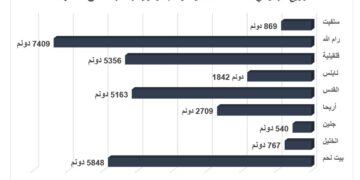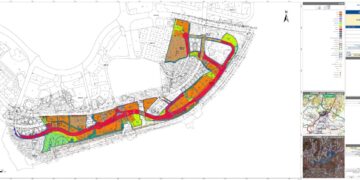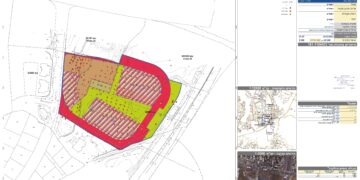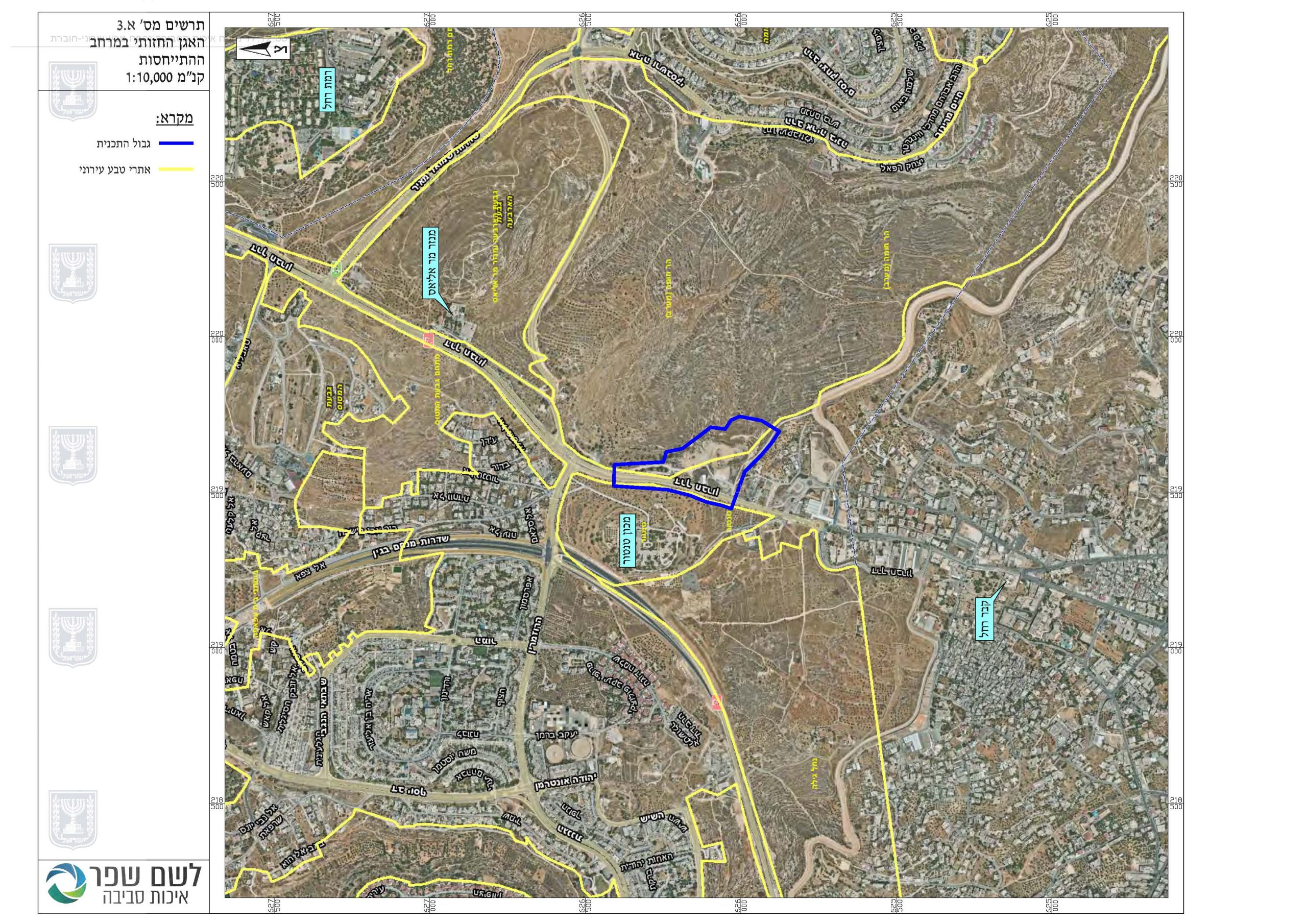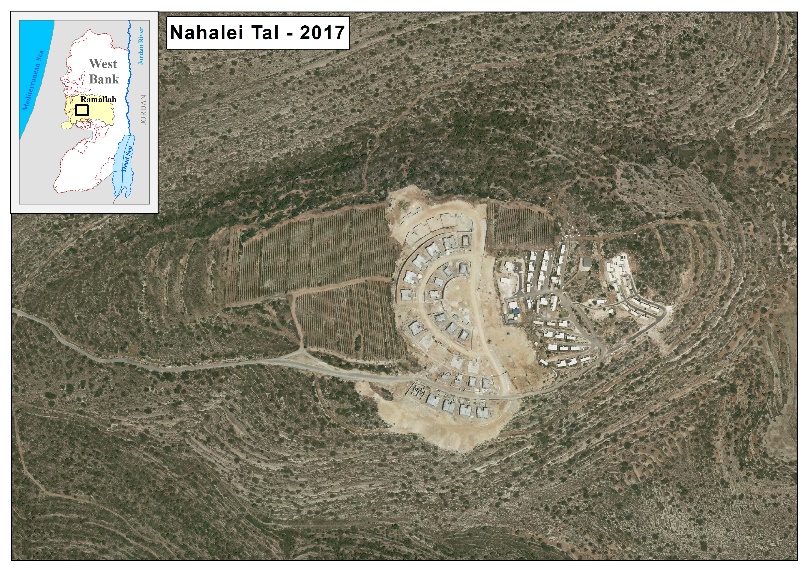- Violation: depositing new master plan
- Location: Marda village- Salfit governorate
- Date: January 27, 2017
- Perpetrators: Planning and Construction Committee- Israel Civil Administration
- Victims: farmers of Salfit
Details:
On January 27, 2017, Higher Planning Council- Israel Civil Administration featured an advertisement in Al-Quds newspaper, stating the depositing of new master plan for Ariel colony founded on Salfit lands.
According to the plan no. 130/18, the occupation decided to expand the transform massive agricultural areas into urban development areas and public facilities. The plan will also serve the infrastructure of the colony.
The targeted lands were declared as follows:
- Natural block number 3; parts of the locations of Ras Ibrahim Al-Mahmoud, Al-Gharaniq and Al-Jabal Al-Sharqi from Marda village.
- Natural block number 4 of Salfit city
Objectives of the plan:
- Changing the use of lands from agricultural, roads and public parks to residential areas, commercial spots, architectural buildings, open areas and new roads
- Specifying the instructions and limits of construction within the plan
- Specifying the instructions of building plan preparation
- Specifying the conditions of obtaining building permits

Photo 1: the advertisement as featured on the website of Israel Ministry of Interior
 Photos 2-4: the new master plan with attached map
Photos 2-4: the new master plan with attached map
 Photo 8: an aerial photo of the target lands
Photo 8: an aerial photo of the target lands
About Ariel:
It is one of the biggest colonies in size in Salfit governorate. The occupation gave it the title of "Capital of Samaria". Ariel dates back to 1978; it is when the colony was established in the aftermath of Camp David agreement between Egypt and Israel.
The colony started on 500 confiscated dunums from Salfit city and Marda village to later seize 13775 dunums, of which 2479 dunums are the colony's built-up area.
Ariel now accommodates a religious collage and a number of factories, hotels and residential blocs. Until 2005, its total population mounted up to 16520 colonists.
The municipal borders of the colony is four times the size of its built-up area. This gives it the advantage to potential and future expansions.
Land Research Center sees Israel continuous expansion on colonies in the West Bank and Jerusalem at the expense of Palestinian and lands a flagrant violation of Human Rights and all international laws and conventions, which prohibit disposition of public properties in occupied countries.
UN Resolutions
UN Security Council Resolution 242 of 1967: calls for
- the Withdrawal of Israel armed forces from territories occupied in the recent conflict;
- Termination of all claims or states of belligerency and respect for and acknowledgment of the sovereignty, territorial integrity and political independence of every State in the area and their right to live in peace within secure and recognized boundaries free from threats or acts of force." [4]
UN Security Council Resolution 449 of 1979: the Security Council determined:
- "that the policy and practices of Israel in establishing settlements in the Palestinian and other Arab territories occupied since 1967 have no legal validity and constitute a serious obstruction to achieving a comprehensive, just and lasting peace in the Middle East"
UN Security Council Resolution 452 of 1979: states that
- "the policy of Israel in establishing settlements in the occupied Arab territories has no legal validity and constitutes a violation of the Fourth Geneva Convention relative to the Protection of Civilian Persons in Time of War of 12 August 1949" and "calls upon the Government and people of Israel to cease, on an urgent basis, the establishment, construction and planning of settlements in the Arab territories occupied since 1967, including Jerusalem."
UN Security Council Resolution 465 of 1980:
- It expressed concern at Israeli settlement policy in the Arab territories and recalled resolutions 237 (1967), 252 (1968), 267 (1969), 271(1969) and 298 (1971). It further called upon the State and people of Israel to dismantle such settlements. The resolution calls on all states ‘not to provide Israel with any assistance to be used specifically in connection with settlements in the occupied territories’.
UN Security Council resolutions in regard to Israeli colonies:
UN Security Council resolution 446, article 3 " Calls once more upon Israel, as the occupying Power, to abide scrupulously by the 1949 Fourth Geneva Convention, to rescind its previous measures and to desist from taking any action which would result in changing the legal status and geographical nature and materially affecting the demographic composition of the Arab territories occupied since 1967, including Jerusalem, and, in particular, not to transfer parts of its own civilian population into the occupied Arab territories;"
- Un Security Council resolution 452, article 3"Calls upon the Government and people of Israel to cease, on an urgent basis, the establishment, construction and planning of settlements in the Arab territories occupied since 1967, including Jerusalem;"
-
Un Security Council resolution 465, Strongly deplores the continuation and persistence of Israel in pursuing those policies and practices and calls upon the Government and people of Israel to rescind those measures, to dismantle the existing settlements and in particular to cease, on an urgent basis, the establishment, construction and planning of settlements in the Arab territories occupied since 1967, including Jerusalem;
Calls upon all States not to provide Israel with any assistance to be used specifically in connexion with settlements in the occupied territories;
-
Un Security Council resolution 242, Affirms that the fulfilment of Charter principles requires the establishment of a just and lasting peace in the Middle East which should include the application of both the following principles:
(i) Withdrawal of Israel armed forces from
territories occupied in the recent conflict;
(ii) Termination of all claims or states of belligerency and respect for and acknowledgment of the sovereignty, territorial integrity and political independence of every State in the area and their right to live in peace within secure and recognized boundaries free from threats or acts of force;
Prepared by
The Land Research Center
LRC





